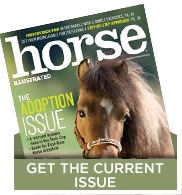I like to think that I’m not a worrier when it comes to my horse. He lives a pretty simple life with 24-hour turnout in a field with a shelter and a couple of buddies. He doesn’t wear shoes, which means I don’t have to worry about him losing one in the mud. He’s semi-retired, which means if he seems a little off one day, I can give him all the downtime he needs without the pressure of getting him ready for a show. Snoopy’s golden years have been pretty relaxed for both of us.

Every fall as we’re putting together our winter content for Horse Illustrated and horseillustrated.com, the same standard blanketing advice makes its way in. If your horse is healthy, unclipped, fed plenty of forage and has access to shelter, he doesn’t really need a blanket. Snoopy is all of those things. Realistically, I know he never actually needs a blanket.
This winter was the pits, as most of you know. It was cold. It was exceptionally snowy by local standards, and it seems to be going on forever. But my first mistake was way back in early winter, during our introduction to the polar vortex. I just couldn’t imagine letting my 25-year-old pony stay outdoors au naturel, so he wore his midweight blankie and I felt good about myself.
But once he was wearing that blanket, it was hard to leave it off. I’ll admit I probably project my own feelings of coldness on Snoopy. Even when temperatures were back to a reasonable winter spot in the teens or 20s, I’d be shivering in my parka and just couldn’t bring myself to leave Snoopy without his.
There were occasional mid-winter thaws that convinced me to remove the blanket. But those always seemed to be followed by rain and then a return to arctic temperatures. That’s the worst. We’d have 50 degrees one day, then it would start raining in the afternoon and continue overnight as the temperatures plummeted and the rain turned to ice and then snow. There are several blanketing options here, and none of them are good.
- Put the blanket on before the rain starts so that he stays dry, which risks overheating him, maybe even causing him to sweat and then I end up with a wet horse anyway.
- Go out later in the evening, do my best to dry the horse off before putting his blanket on. He won’t overheat, but he is already damp under that blanket.
- Put on his sheet before the rain starts, which keeps him dry without being too hot, but then he’s left in a wet sheet with no insulation when the cold front comes through at 2 a.m.
- Leave him naked. He’s got a shelter. HE’S FINE.
The correct answer, of course, is No. 4, but that’s also the one option I never go with. And you know what? Every time that weather scenario popped up (which seems to happen way too often), I would find myself at home late in the evening, listening to freezing rain blowing against my window and I’d think, “I’m so glad I put Snoopy’s blanket on!”
Yes, I admit it’s more for my own comfort and peace of mind than his, but there it is. Blanketing my horse makes me feel good. And he never overheated or got sweaty under his blanket this winter, so I can stand by my blanketing decisions.
On the other hand, we had a surprise early-spring snowstorm earlier this week. Snoopy’s been blanketless for a while, and I just didn’t think to put it on the evening before the storm. When I went out to check on him after he’d spent a day in the blizzard-like snow and wind, was he frozen into a snowbank a la Jack Nicholson at the end of The Shining? No. He was content, alert, healthy, and very much alive. He was fine.
It’s almost April, and for the first time in a very long time, the extended forecast shows nothing below freezing. That means my self-induced blanketing stress might finally be over for another year. This also means it’s almost time to start worrying about fly masks and grazing muzzles, but until then, Snoopy will be free of clothing and accessories and we can both relax.
Back to The Near Side






ready for the summer and Snoopy has it made
Funny and entertaining. I keep my horses with natural blankets on all winter and I feel fine and so do they. They grow their blankets in the autumn and right now they’re shedding them all over the place. The only time I’ve ever had to blanket was when I owned a thin skinned thoroughbred. She shivered when it dropped below 40.
My new horse was kept in her summer coat so she is going to be blanketed until it gets warmer. Silly girl!
I always keep a close eye on the ones that are young, old, sick, or going into winter on the thin side.